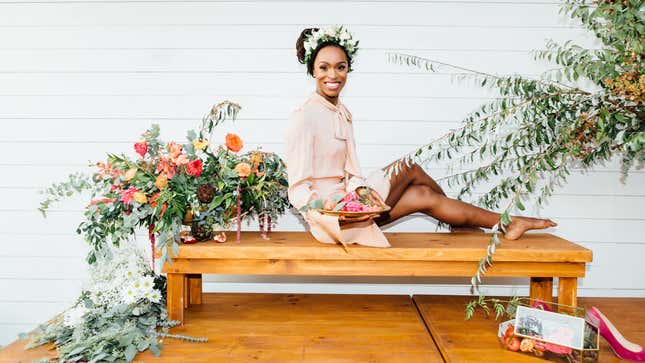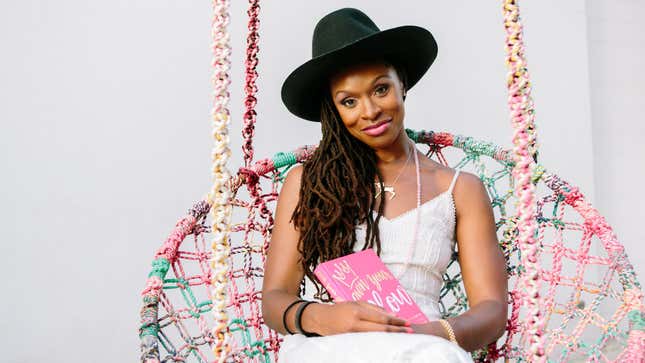
When Latham Thomas was preparing to give birth to her son, she knew she wanted the holistic birthing experience her Oakland, Calif., upbringing inspired, but the then-recent Columbia University graduate had no idea where to begin.
“He was born in 2003, and when I think about 17 years ago [when I was pregnant], there was such a difference in how we approach everything...The internet was not what it is today—we didn’t even use the internet in the same way—people checked their emails maybe like, two times a week,” Thomas told The Glow Up. “And there [were] also not destination websites where you could go for information to sort of gather around what your experience in pregnancy is...I was ready to really explore this path to new motherhood with the same kind of experience that I would have had at home in California, but it was really hard to navigate in New York.”
Reaching out to local OB-GYNs, rather than receiving the support and reassurance a first-time mother needs to make informed decisions about her pregnancy, Thomas found herself lost in a shuffle of bureaucracy.
“They gave me an appointment for the following year; my son was born in July, they gave me an appointment for May, and I was pregnant in October,” she recalled. “I was like, how is this going to work if I’m supposed to get care on a regular basis? How am I gonna see somebody if I have to wait?...They have people out here in the most important time in their lives navigating something so delicate in such a precarious way.”
Convinced that there had to be a better way, Thomas ultimately found the ideal partners in New York City’s Elizabeth Seton Childbearing Center, which gave her a birthing experience she remembers as “amazing.”
“I remember, 20 minutes after my son was born, I told the midwives, I told everybody in the room who was there, ‘I have to protect this for women,’” Thomas shared. “In that, I think that was the advocacy piece that for me really kicked it off; this idea of us having autonomy over not only our bodies but our ability to be able to choose the provider that we wanted and have the type of care that we wanted.”
But unfortunately, the acclaimed midwifery institution would be forced to close its doors months after Thomas’ son was born, due to a sudden and astronomical increase in malpractice insurance premiums that threatened the practices of midwives and doulas nationwide. Galvanized by both the initial frustration and her own ultimately fulfilling experience, Thomas had begun to compile all of her acquired knowledge and research; and suddenly, she knew just how to apply it.
“I felt called...it wasn’t like I chose it. It really chose me and I really had to step into this work...because we need this so much in our community...I knew there had to be a way to eliminate a lot of the barriers that I saw to finding a qualified physician that had a similar philosophy...I kind of developed this rubric of information that I use, but also that I was able to pass down to folks to use for when they were trying to navigate their pregnancies.”
That rubric became the basis for Thomas’ lauded doula training program and maternity lifestyle brand, Mama Glow—also the title of her first book, published in 2012. And while her brand has since garnered acclaim and a celebrity following, Thomas tells us her inspiration was black women, since even as an alumna of a series of esteemed predominantly white institutions, she became all too familiar with the feeling of being marginalized when seeking medical care; an especially delicate juncture during maternity.
“I felt like I didn’t even have [the] language for why I felt that way,” Thomas shared. “I don’t think I even had a term for microaggression then; I don’t even think I could [articulate] what that feeling was when you walk into a space and you know you’re not safe there. I just knew the feeling and I knew that I was trying to avoid that feeling.”
Mama Glow seeks to change that, especially for black mothers. A glance at the brand’s Instagram page is awash with imagery of black women experiencing the full breadth of childbearing, from pregnancy to breastfeeding. Thomas told us that the focus is deliberate, because those experiences belong to us, too.
“What we see now is this white feminist movement around body acceptance. I don’t know like how to describe it any other way, except for that there’s this thing where people feel really encouraged and inspired to share their bodies—whether that’s them breastfeeding or them naked or whatever—and it’s, like, art. But when we do it, it’s seen as anthropology or it’s seen as nudity. When they do it, it’s seen as ‘beauty’ and ‘brave’...

“If everywhere you turn your head the media is centering that, then that’s what’s seen as important and that’s what’s seen as beautiful, and that’s what’s seen as acceptable,” Thomas continued. “And so, I think that we’re up against a lot with that, just like we’re up against a lot when it comes to our bodies being colonized by people who want to partake and pick and choose the parts they want to map onto their bodies and be celebrated for—whether [it’s] our butts, our lips, our thighs...They want the fun stuff; the stuff that’s celebrated is what they want; not the stuff we actually have to deal with.”
Providing not only guidance to aspiring, expectant and new mothers but certified training for doulas, Thomas and Mama Glow are enabling a new generation of practitioners to assist and support predominantly black mothers in everything from fertility to breastfeeding—a function of mothering that black women, perhaps because of our own deeply troubled history of forced wetnursing, have often felt alienated from.
“When we see the pictures of breastfeeding, it’s seen as when black women do it, it is exceptional; it’s like, those are the few that do it,” said Thomas. “When white women do it, that’s, like, just what it is. That’s like the baseline; that’s white women mothering. And that’s not what it’s been; that’s what it’s become—they didn’t ever do this; we did this work. We’re the ones who taught them to do this and so, it’s interesting how it flipped.
“We see this in every aspect of anything that we started or anything that we were the originators of or the people who did something first,” Thomas continued. “Now, it’s not cool to use formula and it’s cool to breastfeed, and here they go, all over our [social media] feeds with their breastfeeding pictures, right?...People see that, but they don’t see us...So that’s the consciousness, and if we don’t have people in our communities that model for us what breastfeeding looks like and what breastfeeding success looks like, then it’s really challenging.” (Editor’s note: Black Breastfeeding Week was Aug. 25 through 31.)
Confronting those challenges—as well as the black maternal mortality crisis and the bleak health outcomes facing black communities—has become Thomas’ lifelong mission.
“I felt really compelled by the vision of Harriet Tubman and carrying people to safe passage,” she told The Glow Up. “This is what we do: We carry mothers to safe passage through darkness and we help navigate a really uncharted territory for most people. It’s their first time—or one of very few times in their life that they’ll do something like this. And being a doula is like bearing witness to that, but also being this very powerful person of support that helps them get through...I see it as not just being of service, but also being like the compass, you know? And supporting the process and holding the light for the mother who’s undergoing this transformation.”

